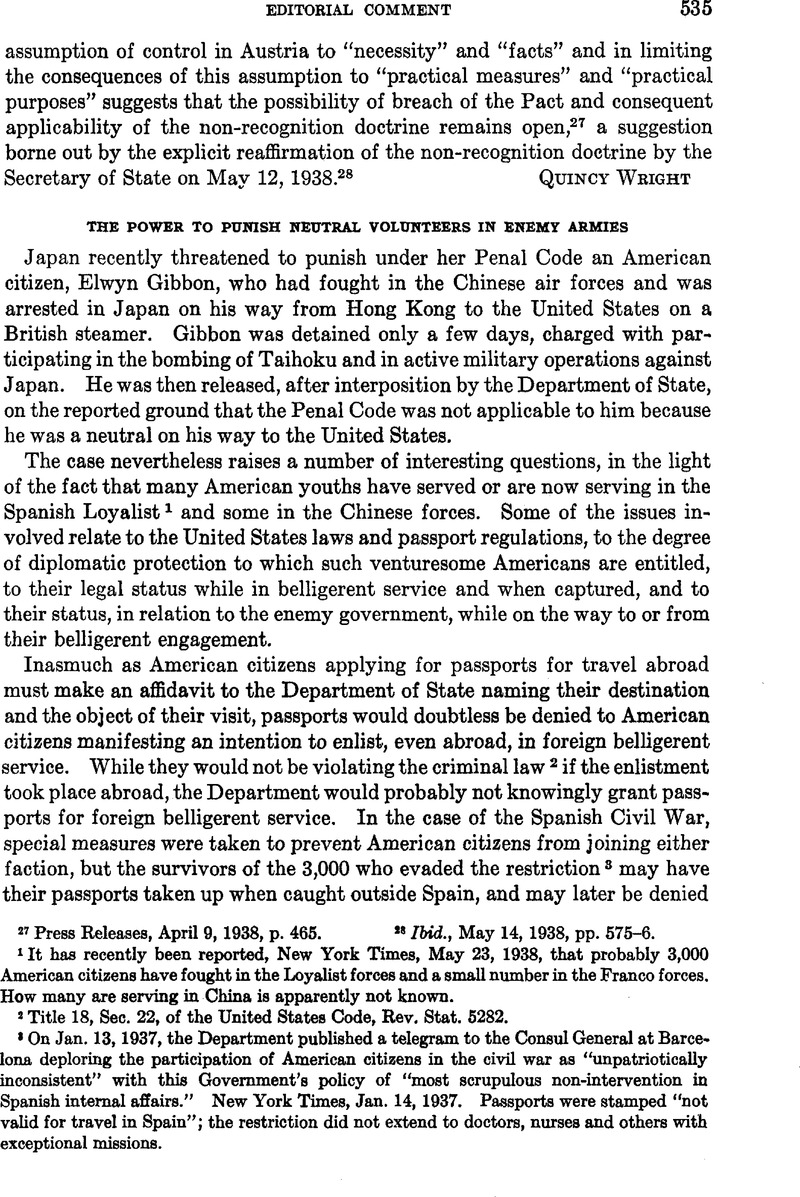Published online by Cambridge University Press: 12 April 2017

1 It has recently been reported, New York Times, May 23, 1938, that probably 3,000 American citizens have fought in the Loyalist forces and a small number in the Franco forces. How many are serving in China is apparently not known.
2 Title 18, Sec. 22, of the United States Code, Rev. Stat. 6282.
3 On Jan. 13, 1937, the Department published a telegram to the Consul General at Barcelona deploring the participation of American citizens in the civil war as “unpatriotically inconsistent” with this Government’s policy of “most scrupulous non-intervention in Spanish internal affairs.” New York Times, Jan. 14, 1937. Passports were stamped “not valid for travel in Spain”; the restriction did not extend to doctors, nurses and others with exceptional missions.
4 Even noncombatant foreigners are exposed to the risks of their location, whether in civil or international war. Secretary Bayard in 1888 maintained: “It is the duty of foreigners to withdraw from such risks and if they do not, or if they voluntarily expose themselves to such risks, they must take the consequences.” Moore’s Digest, VI, 963. This was the position assumed by the United States toward foreigners in the Civil War. It has been maintained by international arbitration. Gelbtrunk (United States) v. Salvador, For. Rel. 1902, 873, 878; cf. Lord Grenville’s reply to British subjects resident in France who protested against requisitions during the Franco-Prussian War. Atlay’s Wheaton, Sec. 151, j; Phillimore, International Law, II, 6. It is not easy to account for the recent announcement (Feb. 25, 1938) that American citizens in China are under “no obligation whatsoever to take precautionary measures” against their injury by the contending armed forces, and that “if American nationals or property are injured in consequence of the operations of Japanese armed forces, the United States will be compelled to attribute” to Japan “responsibility for the damage.” The basis for such responsibility would seem to rest on grounds outside the law. In the case of the Juragua Iron Co. v. United States, 212 U. S. 297 (1909), a claim against the United States by an American corporation whose property in Cuba had been burned and destroyed by order of General Miles because it was thought that it might contain fever germs, the Supreme Court remarked that the property in Cuba had the status of “enemy’s property… subject under the laws of war to be destroyed whenever, in the conduct of military operations, its destruction was necessary for the safety of our troops or to weaken the power of the enemy.” For further precedents on this point, cf. Moore’s Digest, VI, 883 el seq.; Borchard, Diplomatic Protection of Citizens Abroad, 246 et seq. Nor would the position be any different if it were contended, erroneously, that there is no state of war in China, for the United States disclaimed responsibility for the injuries inflicted during the bombardment of Greytown in 1854 and the attack on Vera Cruz in 1914.
5 Cf. Carroll (Great Britain) v. United States, where the penalty for seditious conduct was remitted to expulsion; Santangelo (United States) v. Mexico, April 11, 1839, Moore’s Arbitrations, 3333; Dubos (France) v. United States, Jan. 15, 1880, ibid., 3319. Cf. case of Orton W. Hoover, American aviator, arrested in 1930 while allegedly aiding the Brazilian Government forces against the Vargas revolution, and arrested again in 1932 while allegedly helping the Säo Paulo militia in an abortive rebellion against Vargas. The Department of State undertook to obtain Hoover’s release. N. Y. Times, Nov. 6, Nov. 7, Nov. 14, 1930; Oct. 21, 1932. Case of Lieutenant Commander Harold F. Grow, held prisoner by Peruvian junta. N. Y. Times, Aug. 27, Aug. 31, Sept. 11, 1930, Jan. 13, 1931. Case of Harold B. Dahl, American aviator who was arrested by the Franco forces. The Department of State undertook to prevent the death penalty. N. Y. Times, Sept. 3, 1937, and Sept. 4, 1937. The Department makes inquiries concerning the whereabouts and welfare of prisoners in the Spanish civil war. N. Y. Times, June 1, 1938. In a press conference June 7, President Roosevelt threatened to revoke the licenses of American airplane pilots who enlisted in revolts against established governments abroad. He seems to make a distinction between civil wars and international wars. N. Y. Times, June 8, 1938.
6 This Journal, Vol. 4 (1910), 674; for Secretary Knox’s note see ibid., Supplement, 1910, p. 249.
7 Mr. Rush, Minister at London, to Mr. Adams, Secretary of State, Jan. 25, 1819, Moore’s Digest, VI, 621. Halleck, , International Law (London, 1908), II, 200.Google Scholar
8 The French Code d’Instruction Criminelle, Arts, 5 and 7, and the Criminal Code, Arts. 76, 77, 83–85. One of the crimes against “the security of the state” includes plots and intrigues directed toward facilitating the entry of enemies into French territory and assistance to the enemies of France. Travers, , Le droit pénal international, I, 519 Google Scholar. Garçon, Code pénal annoté, Art. 76, No. 3, quoted in Harvard Research in International Law, Jurisdiction with Respect to Crimes, Dickinson, Reporter, this Journal, Supp., Vol. 29 (1935), p. 559 and cases cited p. 558. It is not entirely clear from the French decisions that criminai punishment is visited on such a neutral serving the enemies of France, but it might be.
9 Harvard Research in International Law, Art. 7, loc. cit., 543 et seq., and excellent commentary thereunder citing statutory, judicial, scientific, and treaty authority.